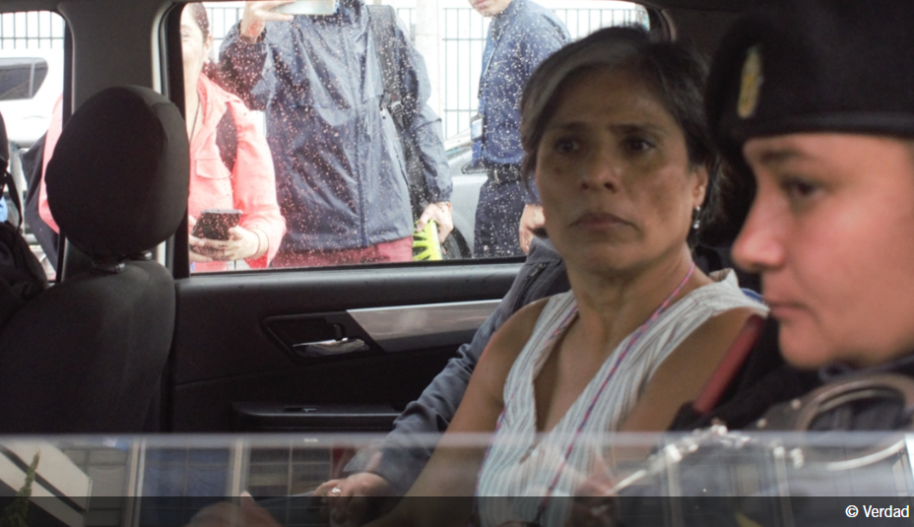By Adeline Neau and Josefina Salomon*
Guatemalan lawyer Flor de María Gálvez Álvarez still struggles to see herself as a refugee.
More than a decade after becoming a member of the now-defunct International Commission against Impunity in Guatemala (CICIG), she barely had enough time to call her parents before having to flee her country in March 2022.
In the months prior, the campaign of harassment and threats against anti-impunity lawyers had increased exponentially. The imprisonment of several of her colleagues on baseless charges was the final straw.
“It scared me and made me really fear for my family,” explains Flor. “I think that’s [the government’s] goal, to silence us.”
She barely had time to pack a suitcase, grab her dog, and leave. Her situation and that of her family, who have remained in Guatemala, continues to be so precarious that she prefers not to reveal the country in which she currently resides.
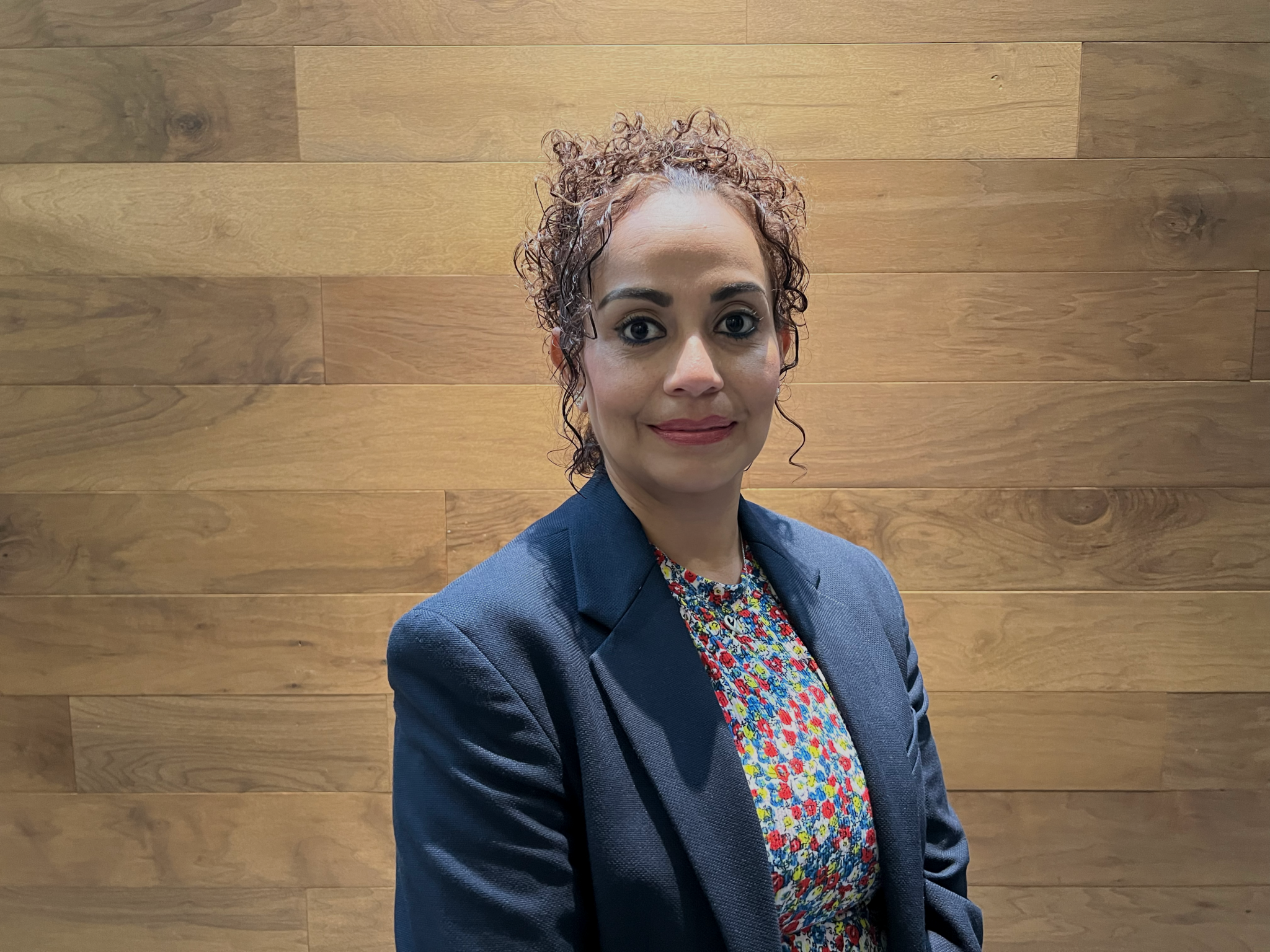
Flor de María Gálvez Álvarez fled Guatemala in March 2022 Photo credit: Carlos Mendoza/Amnesty International
****************
CICIG was one of the most ambitious justice projects in Guatemala’s history, and probably in all of Latin America. With the goal of addressing the historic failures of the country’s justice system, the UN signed an agreement with Guatemalan authorities to create the independent body to work jointly with local personnel from the Public Ministry and the then-new Special Prosecutor’s Office against Impunity (FECI). The idea made sense. CICIG experts would contribute personnel and training to improve the country’s investigative capacity.
The plan worked. During the 12 years in which it operated – between 2007 and 2019 – CICIG and FECI collaborated to investigate and dismantle dozens of criminal networks and structures, along with their links to state officials, resulting in 400 convictions.
The most emblematic of those convictions was the one known as “La Línea” [The Line], involving the investigation of former President Otto Pérez Molina and Vice President Roxana Baldetti. Pérez Molina ended up resigning from the presidency in September 2015 and was then imprisoned and prosecuted for crimes of corruption.
The hope for a corruption-free Guatemala marked by justice is what inspired Flor to join the Commission. There she met Prosecutor Virginia Laparra.
From its inception, the Commission was publicly attacked in campaigns to discredit, defame, and threaten its officials.
Eventually, in 2019, the Jimmy Morales administration decided not to renew its mandate, which in effect ended the project. With its shuttering, the government opened the door to a systematic process of closing civil space, with the Public Ministry closing corruption cases on a massive scale, and even the country’s principal media outlets landing in the crosshairs.
In 2022, there were 3,754 attacks against human rights defenders, and at least 73 justice officials, journalists, and activists were forced into exile, according to data from the Unit for the Protection of Human Rights Defenders in Guatemala (UDEFEGUA).
In many cases, the attacks resulted in baseless judicial proceedings, arbitrary detentions, or, in Flor’s and dozens of other people’s cases, forced exile.
It is estimated that at least 43 prosecutors, judges, human rights defenders, and journalists have been forced to flee Guatemala since 2018, the majority of whom continue fighting for justice in exile.
The climate of corruption and impunity has permeated every facet of the country’s daily reality, including politics. The Semilla (Seed) party of President-elect Bernardo Arévalo, who is due to assume the presidency on 14 January – is one of many actors in the electoral process that have been the target of attacks by the Public Ministry and the Supreme Electoral Tribunal. In response, since October, thousands of people convened by the authorities have taken to the streets throughout the country demanding the resignation of the Attorney General and Head of the Public Ministry, Consuelo Porras, who is accused of misusing the criminal justice system to harass Arévalo and his party’s members of Congress and stop them from taking office. As a result of this criminal persecution, the Semilla party was suspended on 2 November.
Loss of civil rights
For those who were left, the situation kept getting worse. The majority of the people who held public office and denounced corruption were fired, relieved of their posts, or jailed – sentenced to what is known as a “muerte civil” (loss of civil rights), wherein they were denied any chance to effectively participate in society or support their families.
Former prosecutor Virginia Laparra is one of them. On 23 February 2022 she was arrested in the city of Quetzaltenango, where she worked as the head of FECI. On 16 December 2022, a court of justice in Guatemala City sentenced her to four years in prison for the crime of “abuse of authority” after she initiated disciplinary proceedings against Judge Lesther Castellanos (Flor, who worked in CICIG at the time, also reported him for leaking information about a case to third parties).
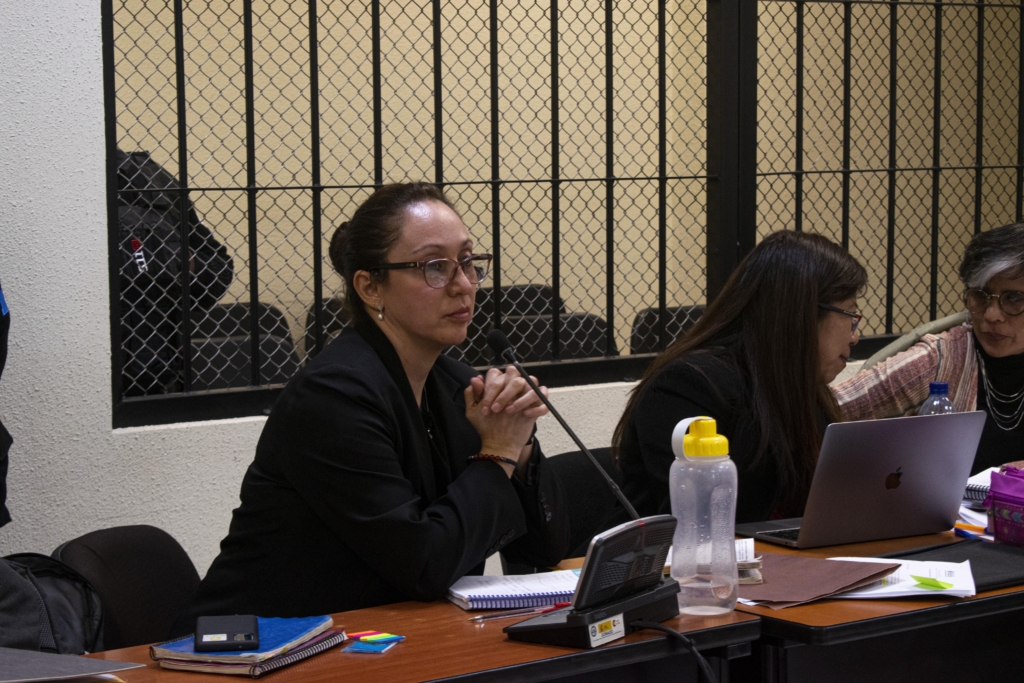
Former prosecutor Virginia Laparra was arrested in February 2022. Photo credit: Verdad y Justicia Guatemala
Amnesty International declared Virginia a prisoner of conscience, concluding that the proceedings were riddled with irregularities and that there was no convincing evidence to support her conviction. The authorities took several days to take her first statement, used arbitrary reasons to keep her in preventive detention, and part of the trial was carried out under conditions of confidentiality, with no access for the press, which affected Virginia’s right to a transparent trial. Virginia faces another trial that was also initiated by Judge Castellanos that could see her sentenced to another eight years in prison.
Meanwhile, Judge Castellanos, whom Virginia had charged, was rewarded by being named President of the National Torture Prevention Mechanism.
Virginia is currently imprisoned in the Matamoros military garrison, far from her two daughters, who live more than 200 kilometers away. Her health has deteriorated in recent months and she has denounced not having access to adequate treatment.
Virginia’s case became highly emblematic in an environment laden with dangers. But the authorities didn’t stop there.
Anyone who, like Virginia or Flor, dares to denounce the impunity and corruption in the justice system ends up in the crosshairs.
Criminal lawyer and human rights defender Claudia González Orellana is another victim. Claudia worked in CICIG, providing support to the investigation of high-profile cases such as Magistrate Blanca Stalling, who was removed from office and brought to trial for having coerced Judge Carlos Ruano, who is now in exile out of fear of reprisals. Stalling, who was reinstated in her post as magistrate in September 2022, denounced everyone who worked on the case against her, including Claudia.
After CICIG was dismantled, Claudia led the defense of those who were being unjustly harassed in court, including the former head of FECI, Juan Francisco Sandoval, who now lives in exile. For several months, she also served as Virginia’s lawyer. The job was not easy.
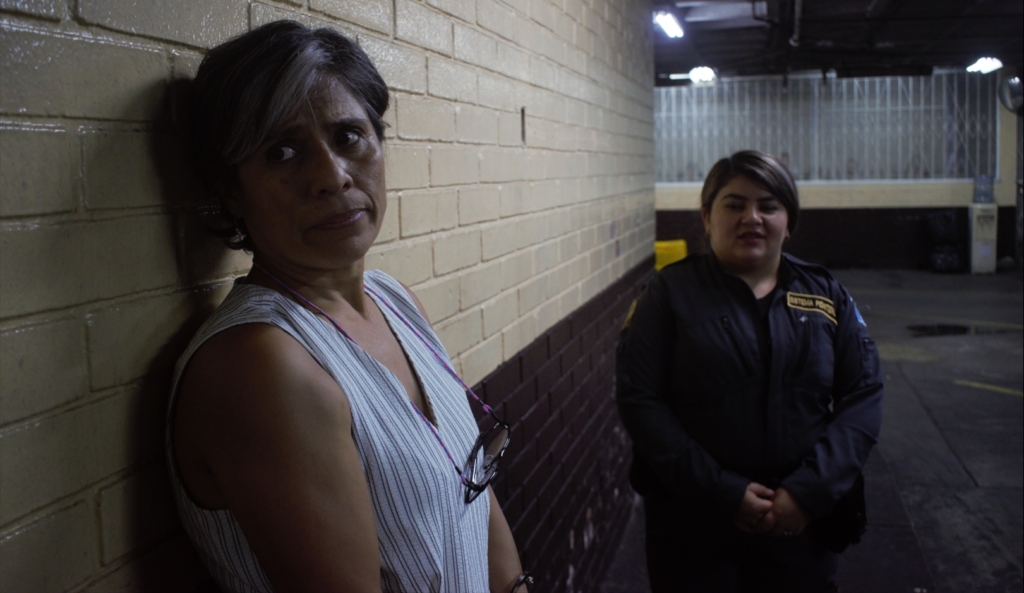
Criminal lawyer and human rights defender Claudia González Orellana was detained in August 2023. Photo credit: Verdad y Justicia Guatemala
“We’re under surveillance… wherever we go they take photos of us and we find out later because they’re published on social media and comments are made in the hearings like ‘we’re going to denounce you or we already know (a certain thing).’ There are very subtle comments made that make you say: no one else knows this,” explained Claudia.
“They’ve realized that threatening defense lawyers ensures that people accept the charges against them. So that’s another thing they’re pushing in the hearings,” she said. Moreover, the discrimination they suffer for being women leads to constant attacks against them.
Four days after our last conversation regarding the campaign to free Virginia on 28 August, Claudia was detained under a warrant that did not specify the charges against her. Ever since, she has spent 23 hours of every day locked in a cell in the Mariscal Zavala Prison.
A paralyzed country
Within this context of widespread criminalization, where the judiciary uses all the tools at its disposal to punish those who hold opposing opinions, fear spreads like wildfire. Finding people willing to defend those who are criminalized because of the work they perform requires an extraordinary degree of bravery.
Yet many female lawyers have a surfeit of bravery, including Wendy Geraldina López, an indigenous lawyer who has been a member of Virginia’s defense team since the latter was arrested, and is now the only member of the initial team not to have been detained.
Wendy has worked for years defending indigenous peoples’ human rights. In 2021, she approached FECI to ask for support. When she was unable to meet with the head of that institution, Juan Francisco Sandoval, because he had fled into exile, alarm bells began to go off.
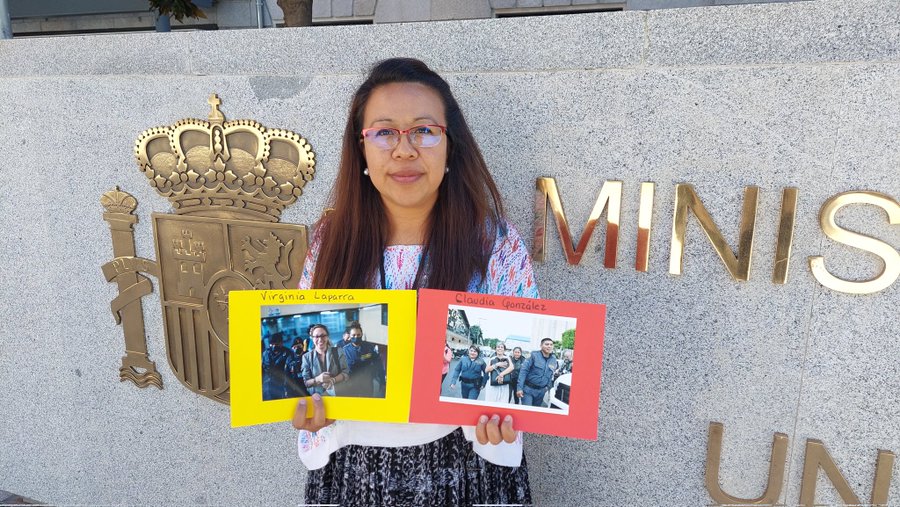
Wendy Geraldina López has experienced racism and discrimination in the courts for being an indigenous woman. Photo credit: Amnesty International
“I didn’t know Virginia, but when she was arrested, I immediately said: this isn’t over and it’s going to get worse for us. And right then I get a call and they tell me that they need a lawyer, that they’d asked others but they hadn’t wanted to take the job on,” she explained.
As with Flor and Claudia, the process has been plagued by obstacles for Wendy. Besides the harassment and misogyny the three female lawyers have suffered, she experienced racism and discrimination in the courts for being an indigenous woman. “I pity you, you’re an embarrassment,” the prosecutors tell her, without the judge intervening. She has also reported having her phone tapped, which means having to take elaborate security measures that cause additional stress and anxiety.
The harassment is so extreme that she fears being imprisoned like Claudia. In fact, the judge trying Virginia’s case has opened a criminal file against her as well as a disciplinary process before the bar association.
“This is the worst time for defending the rights of [justice] officials, there are no due process guarantees. We have no legal security, we see how everything is being coopted,” Wendy says.
***************
Virginia, Claudia, Flor and Wendy are playing with fire – and they know it – however their commitment overcomes their fear. They say that someone has to do it, as the rule of law in Guatemala is hanging by a thread.
“They got me to leave the country,” says Flor. “But they haven’t silenced me. I don’t want to be silent. I know that things might not change, but at least I can shine a light on what’s happening. It has to change at some point.”
Prior to being detained, Claudia had already warned about the dangers of a justice system that is coopted by whichever authorities happen to be in power.
“Personally, I believe we have to start from scratch. In 1994, when the Code of Criminal Procedure came into force, we started from scratch. Now it’s much more challenging because we’re working on our own defense. But we have to press forward, we can’t leave [our colleagues] there inside. That’s what motivates me. Even though we know that the same thing can happen to us, too,” explains Claudia.
“We’re hopeful that there will be light at the end of the tunnel,” she says, and that’s what keeps the flame alive.
On 10 November, an appeals court granted Claudia’s request for alternatives to pre-trial detention. At the time of writing, her family and lawyers were awaiting her imminent release from prison and preparing for her to continue her defense at liberty.
*Adeline Neau is a researcher at Amnesty International. Josefina Salomon is an independent journalist.
This article was published in Rolling Stone en español












